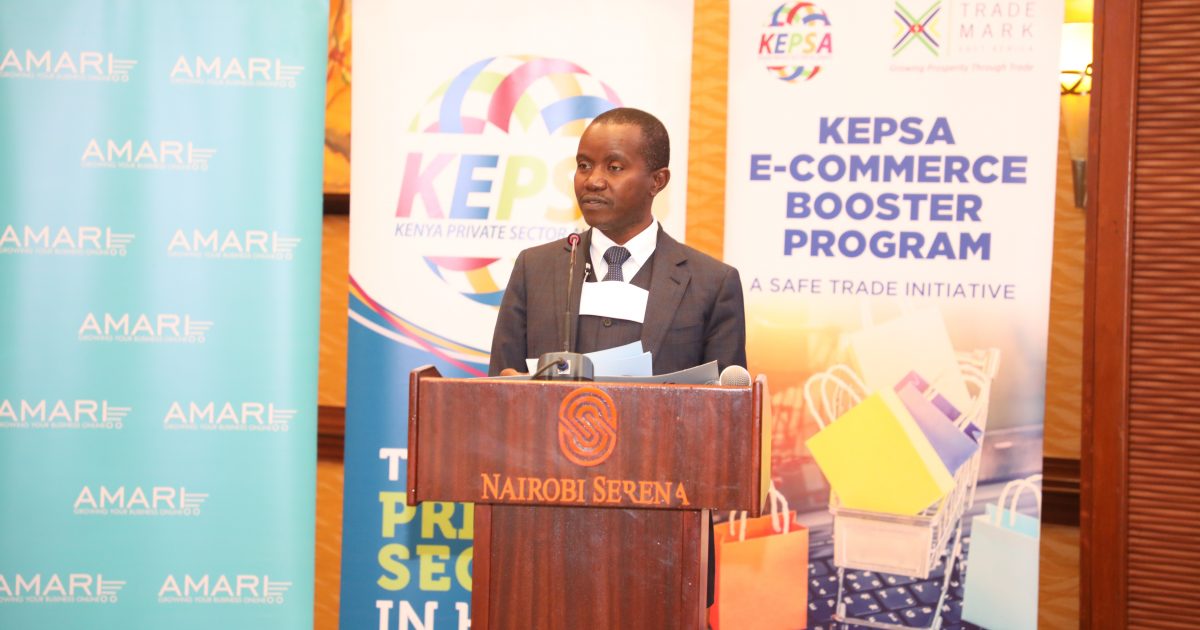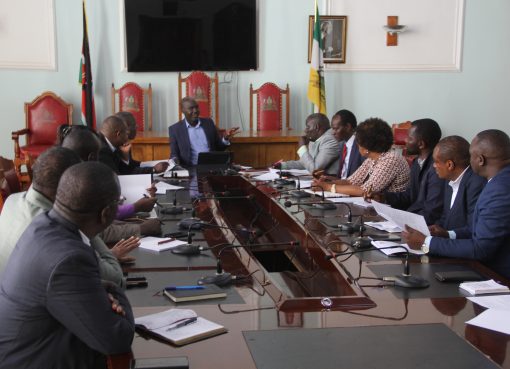It is projected that the e-commerce revenue in Kenya will reach Sh164 billion in 2021 and grow to Sh 254 billion by 2025.
The Cabinet Secretary for ICT, Innovation and Youth Affairs Joe Mucheru, said as the penetration of products grow, the profit margins are expected to reduce, a need he said requires e-commerce players to plan ahead to reduce cost drivers and increase technology driven solutions.
Mucheru said that the Kenyan government, private sector entities and other partners are supporting sustainability through digital training and skills for Kenyan youth eager to participate in digital markets and trade so as to sustain e-commerce.
The CS was speaking during the Launch of the Kenya Private Sector Alliance (KEPSA) E-commerce Booster Portal Programme aimed at aiding the struggling Micro, Small and Medium sized Enterprises (MSMEs) in Nairobi.
“We are doing this through the Ajira Digital Program in partnership with the Kenya Private Sector Alliance (KEPSA), the Mastercard Foundation and eMobilis,” said Mucheru.
He added “The impact of this to our economy is that our citizens will possess high levels of digital and entrepreneurial skills, which will aid in tapping opportunities and overcoming setbacks in e-commerce”
The CS further revealed that the e-commerce sector has significant potential to create new jobs directly on online marketplaces, supporting services and spin-off economic activities.
‘If we are to aggregate the businesses that are carried out through social media platforms such as WhatsApp, Google, Facebook and Instagram among others the number of e-commerce start-ups are in their thousands”, the CS disclosed.
He noted that E-commerce also offers a vibrant marketing place where traders, buyers, consolidators and middle-men interact online, as well as a reliable and speedy logistics network capable of last mile delivery at reduced costs, and a trusted payment platform to accommodate customer categories and wallet transactions.
Mucheru at the same time revealed that Kenya’s is the 5th largest economy in Sub-Saharan Africa and was ranked 56 out of 190 economies in 2019 in the World Bank Ease of Doing Business.
The CS said that digitization of government contributed to an improvement in this ranking disclosing that a 2020 report by the Internet World Stats rated Kenya’s internet penetration as the highest in Africa with 87.2 percent of the population connected.
“As at September 2020, a survey conducted by the Communications Authority of Kenya noted that there were 59.8 million active mobile subscribers in Kenya; and in terms of its geographical location, Kenya is the “heart” of Africa”, the CS said.
The CS said that the government is supporting e-commerce through a three-pronged approach: – Adapt-Accelerate-Sustain.
In regards to ADAPT, we will continue to focus on a robust formulation of policy and regulatory frameworks including our forward-thinking National ICT Policy 2020. Other relevant policies and regulations that are in place include the Data Protection Act 2019; the National Cyber Security Strategy (2014); Digital Economy Blueprint 2019; and the National Broadband Policy”, said the CS.
“We are also at the tail-end of setting up a policy framework for a National Addressing System (NAS) that will enable the geo-location of homes and properties. A pilot study will be conducted in Nairobi County before fully scale roll out to other parts of the country”, the CS said.
CS Mucheru said that government is also converting the physical post office box to virtual addresses in an increasing growing digital space.
“The Postal Corporation Kenya (PCK) connects over 600 postal points in the country. PCK has incorporated physical and virtual box services in the last two years. This links a physical box to a phone or online connection through a service dubbed M-Post (mobile post)”, Mucheru observed.
He also revealed that the government is linking e-commerce to digital enabled government services with an intention to familiarize Kenyan citizens with ‘shared trust’ for online services by creating a shift from walk-in services to e-Government.
“This promotes a mutual trust that online services and participation in digital markets is possible”, the CS said.
CS Mucheru further said that his Ministry is increasing the internet and mobile network grid in the country by investing in last mile connectivity.
“In addition to laying fibre optic cable, we work closely with alternative broadband solution providers and are keen to offer countrywide connectivity to all through the Universal Service Fund (USF),” said CS Mucheru.
To accelerate the growth of this sector, the CS said that the government is tackling the cost levers: “Costs associated to logistics, warehousing and precision in delivery location influence profit margins. E-commerce in Kenya has led to a burst in start-up logistic companies hoping to offer delivery at minimal costs within the urban centers”; he said.
Saying that E-commerce companies will benefit from access to accurate last-mile delivery details, CS Mucheru disclosed that the economy will also witness more online engagements and the establishment of a wider logistics network across locally and globally.
“The African Union developed the Digital Transformation Strategy for Africa (2020-2020), under which innovations and digitalization are identified as key stimulants for job creation, poverty reduction, inequality reduction and facilitation of the delivery of goods and services”. CS Mucheru observed.
Speaking at the launch KEPSA E-Commerce Booster Portal in Nairobi, KEPSA Chief Executive Officer, Ms Carole Kariuki said the Alliance is focused on assisting business leaders comprehend the dynamics of business and market in the changing world and how to identify available strategic opportunities.
She said the Covid -19 pandemic has pushed businesses to be innovative by expanding their sales and services on e-commerce platforms, noting that the e-commerce program has enabled MSMEs gain digital skills to engage in digital economy and improve their livelihoods.
The program brought at least 1300 MSMEs on board on various e-commerce platforms in market places which helped them to increase and diversify their revenue streams hampered by the Covid pandemic.
Kenya Private Sector Alliance (KEPSA) has trained over 2,500 Micro, Small and Medium Sized Enterprises (MSMEs) through the KEPSA E-Commerce Booster Program since its launch in February 25th this year.
The program targeting at least 2,000 entrepreneurs is mainly focusing on imparting e-commerce, digital marketing, aftersales, content creation and management skills to entrepreneurs.
TradeMark East Africa Kenya Country Director, Ahmed Farah in his remarks acknowledged that most enterprises were affected by the Covid -19 pandemic which led to closure and loss of employment.
“The measures that TradeMark prioritizes in its approach to work are aimed at reducing poverty and creating wealth for our people while we protect our environment,” said Farah.
In his address, the Finance and Private Sector Development Programme Manager at the European Union (EU) Delegation to the Republic of Kenya, lauded the e-commerce program achievements and promised that EU will increase funding to TradeMark East Africa, as well as continue supporting KEPSA e-commerce Booster Program.
E-commerce has proved to be an important tool and solution for both businesses and consumers, as most people are now conducting their sales and purchase online, and this is evident in online sales of medical supplies, household essentials and food products.
By Bernadette Khaduli





